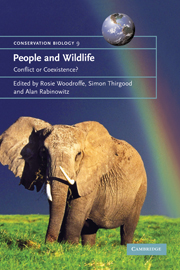Book contents
- Frontmatter
- Contents
- List of contributors
- Foreword
- Acknowledgements
- 1 The impact of human–wildlife conflict on natural systems
- 2 The impact of human–wildlife conflict on human lives and livelihoods
- 3 Characterization and prevention of attacks on humans
- 4 Non-lethal techniques for reducing depredation
- 5 Techniques to reduce crop loss: human and technical dimensions in Africa
- 6 Evaluating lethal control in the management of human–wildlife conflict
- 7 Bearing the costs of human–wildlife conflict: the challenges of compensation schemes
- 8 Increasing the value of wildlife through non-consumptive use? Deconstructing the myths of ecotourism and community-based tourism in the tropics
- 9 Does extractive use provide opportunities to offset conflicts between people and wildlife?
- 10 Zoning as a means of mitigating conflicts with large carnivores: principles and reality
- 11 From conflict to coexistence: a case study of geese and agriculture in Scotland
- 12 Hen harriers and red grouse: the ecology of a conflict
- 13 Understanding and resolving the black-tailed prairie dog conservation challenge
- 14 People and elephants in the Shimba Hills, Kenya
- 15 Safari hunting and conservation on communal land in southern Africa
- 16 Socio-ecological factors shaping local support for wildlife: crop-raiding by elephants and other wildlife in Africa
- 17 Jaguars and livestock: living with the world's third largest cat
- 18 People and predators in Laikipia District, Kenya
- 19 Searching for the coexistence recipe: a case study of conflicts between people and tigers in the Russian Far East
- 20 A tale of two countries: large carnivore depredation and compensation schemes in Sweden and Norway
- 21 Managing wolf–human conflict in the northwestern United States
- 22 Policies for reducing human–wildlife conflict: a Kenya case study
- 23 An ecology-based policy framework for human–tiger coexistence in India
- 24 The future of coexistence: resolving human–wildlife conflicts in a changing world
- References
- Index
Foreword
Published online by Cambridge University Press: 23 November 2009
- Frontmatter
- Contents
- List of contributors
- Foreword
- Acknowledgements
- 1 The impact of human–wildlife conflict on natural systems
- 2 The impact of human–wildlife conflict on human lives and livelihoods
- 3 Characterization and prevention of attacks on humans
- 4 Non-lethal techniques for reducing depredation
- 5 Techniques to reduce crop loss: human and technical dimensions in Africa
- 6 Evaluating lethal control in the management of human–wildlife conflict
- 7 Bearing the costs of human–wildlife conflict: the challenges of compensation schemes
- 8 Increasing the value of wildlife through non-consumptive use? Deconstructing the myths of ecotourism and community-based tourism in the tropics
- 9 Does extractive use provide opportunities to offset conflicts between people and wildlife?
- 10 Zoning as a means of mitigating conflicts with large carnivores: principles and reality
- 11 From conflict to coexistence: a case study of geese and agriculture in Scotland
- 12 Hen harriers and red grouse: the ecology of a conflict
- 13 Understanding and resolving the black-tailed prairie dog conservation challenge
- 14 People and elephants in the Shimba Hills, Kenya
- 15 Safari hunting and conservation on communal land in southern Africa
- 16 Socio-ecological factors shaping local support for wildlife: crop-raiding by elephants and other wildlife in Africa
- 17 Jaguars and livestock: living with the world's third largest cat
- 18 People and predators in Laikipia District, Kenya
- 19 Searching for the coexistence recipe: a case study of conflicts between people and tigers in the Russian Far East
- 20 A tale of two countries: large carnivore depredation and compensation schemes in Sweden and Norway
- 21 Managing wolf–human conflict in the northwestern United States
- 22 Policies for reducing human–wildlife conflict: a Kenya case study
- 23 An ecology-based policy framework for human–tiger coexistence in India
- 24 The future of coexistence: resolving human–wildlife conflicts in a changing world
- References
- Index
Summary
In the origin myths of many human cultures, a central theme is the distinguishing of humans from the rest of nature (Lévi-Strauss 1964). According to these histories, before humans as humans existed, people lived in a way indistinguishable from other animals – depending on wild species and eating them raw. After the origin, after emerging, after being created, after The Fall, humans are distinguishable from the rest of nature through the acquisition of culture and by means of it. People cook their food, people alter their landscape, people cultivate crops and raise domestic animals. In the words of the Judaeo-Christian Bible: ‘the Lord God sent him forth from the Garden of Eden, to till the ground …’ (Genesis 3: 23). And by contrast, wild animals define humanity. The relationship with wild species is fundamental to our self-identity. At its core, this book is about that relationship.
We humans value nature and wild species in many contexts and situations. Wild species are of cultural and social importance. They are valued as resources. We value their very existence. On the other hand, humans often and increasingly come into conflict with wildlife. We humans channel more and more of the world's resources to support our own kind. We now channel more than 40% of the terrestrial net primary productivity, which is the sustenance of all animals and decomposers, to our own ends (Vitousek et al. 1986).
- Type
- Chapter
- Information
- People and Wildlife, Conflict or Co-existence? , pp. xiii - xvPublisher: Cambridge University PressPrint publication year: 2005



